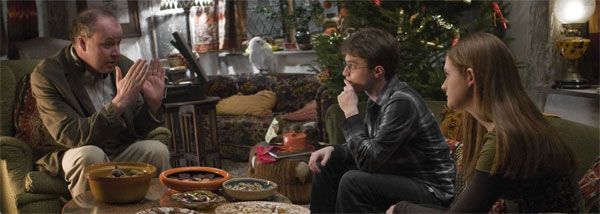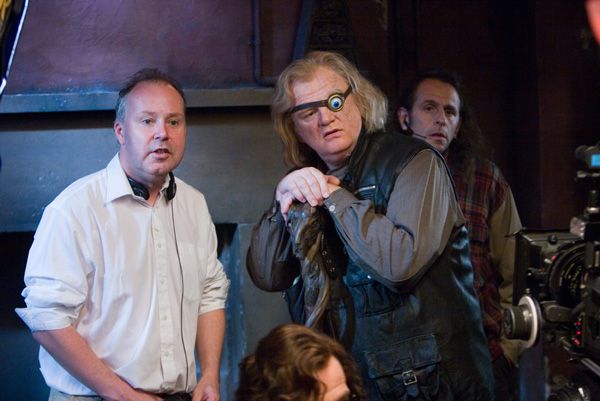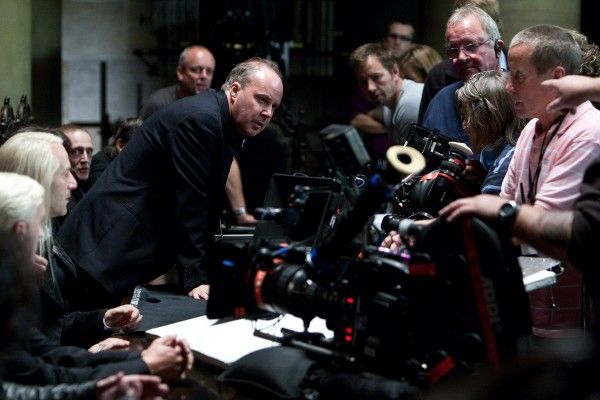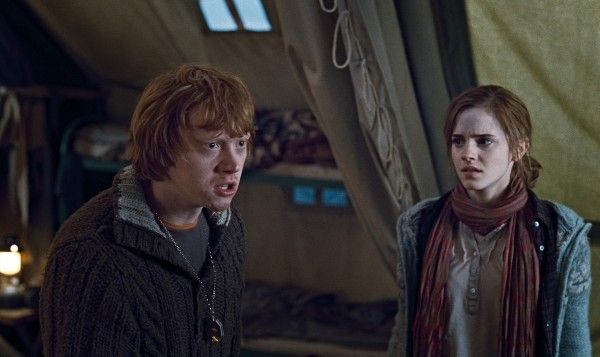With Harry Potter and the Deathly Hallows – Part 1 getting released in a few days, Warner Bros. held a big press junket this past weekend in London and I got to fly across the pond to attend. Yesterday I posted my interview with Emma Watson, and for today's installment, I've got director David Yates.
During the intimate roundtable interview, Yates talked about the premiere the night before, explains why they decided to break up the last book into two installments, talked about why they shelved 3D at the last second and confirmed Part 2 will definitely be in 3D. He also talked about the big battle at Hogwarts in Part 2, filming on location and how the actors loved it, and says he has no idea what he'll be directing after Potter because he hasn't had the time to read any scripts.
Finally, due to Warner Bros. allowing us to use flip cams, after the jump you can either read the transcript or watch the interview. What are you waiting for:
And one last thing...for more coverage on Harry Potter and the Deathly Hallows, click here. The link includes trailers, on set interviews, set reports, posters and more.
Also, check back everyday this week for a new interview. Here's the video followed by the transcript.
-
David Yates: I’ve had about three hours sleep so I’m probably not going to make any sense whatsoever so I apologize in advance.
Question: Was that because you were celebrating the premiere?
David Yates: Yeah, you know, it was such a nice evening because you get to catch up with everybody as well. All the crew are there and you invite your family and my relatives from the north who I haven’t seen for ten years and it’s their first premiere and it’s all far too exciting.
When you started this, you had no idea you would end up directing half of the Harry Potter oeuvre?
David Yates: No, that wasn’t the plan. I was just in for one actually and then they asked me back and then they couldn’t get rid of me for the last two. I was determined to stay; but no – it was never part of their program.
Was it your idea to say part seven should be in two parts?
David Yates: No, it was a joint decision. It was a decision that really came about between Steve Kloves (screenwriter of the Potter films), myself and the Davids (in regards to producers David Barron and David Heyman). We all sat down and agreed it was probably an interesting and cool thing to do. It was a creative choice rather than a studio choice. I mean [the studio was] delighted that we were discussing it but we felt we wanted to… I wanted to make two very slightly different films. A kind of melancholic, haunting first film like a chase thriller road movie. Something where you see these kids and their innocence break and then I wanted to make a bigger classic fantasy film with dragons. They’re both slightly different movies but they’re from the same book. The thing that ties them together is just linear narrative that runs through the middle but ultimately they’re two very different movies.
When I spoke to you on set, you were seeming a little apprehensive about the 3D post conversion. It ended up not happening. Are you happy about it or are you sort of like ‘I wish we could of done that’?
David Yates: I saw some really cool 3D shots, which were really beautiful for part one, and I saw some shots that needed a lot of work and that we had to revise and change. In an ideal world, if we had a bit more time, it would have been interesting to have it in 3D but we had not enough time to make it work and enhance and help the film in an interesting way. I think if you do a 3D conversion, its got to add value. And we were getting to the point where it was actually gonna just work in some sequences and some sequences would be a bit distracting. We had a very grown up chat with the studio about it and said ‘Look, this has to be really good if we’re going to do it’ and it was a big call for them to say ‘Okay, let’s not do it’. But we agreed that it’s not the right thing to do. So was I relieved? I was relieved because they didn’t push us into a bad 3D conversion and they were grown up enough to acknowledge that it’s not good for the franchise and it wasn’t good for this film. So that was a relief. Peter Doyle, who grades these movies – he graded Lords of the Rings and he’s graded all my Potters - he’s a really gifted colorist. We sat and watched some of these shots and he said this is a really interesting aesthetic because I wasn’t using 3D like “that”. I was using 3D in really subtle ways as an aesthetic to just bring more depth and then musically to occasionally give you more depth in some of the bigger scenes. But it was a very subtle use and it was actually really interesting and it was really fun but we didn’t have time to do it properly and right throughout the movie. So it was a relief but there’s a part of me that wanted to see that aesthetic throughout the film because I think it would have been interesting.
Is there actual time to do [a 3D conversion] for the second part?
David Yates: Yeah, yeah we’ve got to do it for the second one but we’ve been working on 3D since spring of last year and the movie doesn’t come out until July so we’ve got a chance, I guess, to get it right this time. We’ve all made a commitment. We want to do it. We spent a lot of money on the first film on the conversion process. We’re spending a lot of money on the second film. Actually it’s more suited to the second movie in terms of battles, dragons, giant spiders and everything. It’ll feel like a richer experience in 3D, I think. So we really want to do it.
Speaking of the second movie – a lot of fans are looking forward to the Battle at Hogwarts – myself included. You’ve obviously maybe done a rough cut or something like that. Is it a ten-minute sequence, is it thirty minutes? How much is that battle?
David Yates: It’s intercut with Harry’s search for the horcrux. Personally, I’m not a huge fan of battles. I like battles. I think they’re great but I’m interested in the characters and their story but we have big battle. There’s plenty of it. I couldn’t put a time frame on it but the whole second act is pretty big. Actually the whole film’s pretty big. But honestly, Steve’s not a fan of battles. I’m not a fan of battles. But I’m more of a fan of battles than Steve is so I was pushing the battles. Steve loves character and nuance. As do I of course… but we’ve got battles. It’s more about chasing these horcruxes and it’s interspersed with battle.
Can you talk about how the kids seem to have come into their own as actors and people?
David Yates: They’re getting older, which just means they’ve got more resources at their fingertips because as an actor, everything you do comes from your experience of life. More than your experience on a film set, frankly sometimes. It’s the last time they’re ever going to play these characters. They had a stake here to prove themselves to the fan base and to a global audience. The material’s a bit richer and more nuanced this time. A bit more melancholic. They get more time with these quite grown up scenes and I always push them to try and find authenticity in what they do together. That’s what I want from them. So all those things together meant, I think, that they’re able to give more than they’ve ever had a chance to give before and they were so excited when they first read the script. I sat with them in the boardroom at Leavesden and we sat and they read it and they were so buzzed because they got to do all these things together which was less about magic and more about them.
What was it like being at the locations? They’re quite remote places where you filmed. Was it quite intense? What did it feel like?
David Yates: Actually, it was great to get out of the studio and it was liberating for the young actors as well. There’s a scene – Dobby’s death on the beach. Dan sat on the sand. We can’t stop shooting. We have to continually shoot because the tide’s coming in. He’s really cold. He’s on the verge of hyperthermia and I go ‘Right – go again, go again’. And it’s all quick. And the sand’s sticking between his fingers. And he found it so exhilarating acting in those circumstances because when you put all those elements around you, as you act, it suddenly makes you connect with a truth more; where if you’re in a drafted green screen studio at Leavesden, it’s not quite the same. No matter how motivated you are and no matter how much you try and describe what’s there you cant compete with reality. So being out was very liberating for them and for us.
Can I ask you about the dance sequence? It’s very tender and funny and there’s a bit of clowning. Tell me about how you worked that scene out with the actors. Did you give them some rope to do what they wanted or was it very strictly choreographed?
David Yates: We had a choreographer, a lovely choreographer who I’ve worked with before and he did a version of it for me. I left him with the guys for two hours and I came back and sat down and we played the music and they did their dance and it looked like this ballroom dance and I said ‘You know what – I’m not sure that’s quite right because it feels so beautifully choreographed’. So I said to the choreographer ‘Can we just make it like they’re goofing around so they don’t quite know what they’re doing’ and then he worked this very rough version of it out that allowed them to be them basically. Slightly clumsy. Slightly awkward. And that was it. That just felt right honestly. And it’s a scene that really divides people. Some people love it and some people hate it. I love it for the reasons you cited – it’s tender and funny and moving. It was partly them and partly our choreographer who helped.
How satisfying was it to get that performance out of Rupert [Grint]?
David Yates: Fantastic. I think Rupert could be a really wonderful straight actor ‘cause we always think of him as a comedian and I sometimes watch Rupert when he’s not on camera and he’s just off to the side between takes – because he’s the quietest member of the cast and crew. He’ll always just sit there and people will move around him almost like he’s not there he’s so quiet and graceful. There’s a real poetry about Rupert as a human being, as an actor. I think he could be a really, really good straight actor. But it’s interesting the audience is so programmed to just find him funny all the time. He’s a funny guy, isn’t he, but it was great for him to do some serious stuff.
Can you talk a little bit about Emma Watson blossoming into the role [of Hermione]?
David Yates: I think she’s ignited. I think something happened during the filming of part one where she – she’s always been quite clever and she’s always been very thoughtful about how she approaches the acting that she does and she was like that on five and on six. She’s actually really an intensely bright person. But what I think happened on this one is she started to appreciate how she could tap into an emotional level and tune into things, which most great actors do. They just tap into the stuff inside and she started to do that and it was really exciting when she did.
What enabled her to do that? Was it life? Just growing up? Was she in college when she started this?
David Yates: No, she started college not long after actually because we had a break. We broke at around her college experiences. I think the material allowed that to happen. As is the fact she’s getting a little bit older allowed it to happen. The minute you recognize that in someone, you start to try to reach for it. You start to try encouraging them to go that place and so it’s a combination of many things.
You’ve been linked, with Potter running down, to a number of projects. What’s actually floating for you? What are you thinking about for the future or is it a break?
David Yates: I’m going to have a break for a bit. I think I’m going to just stop for a few months. I’ve got lots and lots of scripts on my desk. Very many that are all very interesting but I haven’t actually read any of them because I’ve been too busy. I’m looking to try and checkerboard – looking for something with the scale of Potter but really tender and smart so I don’t want to be too specific about it because there’s a lot I just haven’t had the chance to look at.
I’ve seen your name on Variety and Reporter linked to stuff. Is that accurate?
David Yates: It’s mainly conjecture. You know – there’s a lot of conjecture. You have to be careful about what gets printed basically because I’ve been so busy and I haven’t been reading anything.
How has this changed your career – these four movies, one of the biggest franchises the movies have ever seen?
David Yates: It’s given me an enormous amount of experience and it’s been a tremendous few years for me professionally and personally. The people I’ve worked with have been wonderful. It’s been great. In a curious way, I feel like the curator of the series. When I come out, I’m going to feel like a first time filmmaker again so I have this enormous ambition when I come out to try a few different things that aren’t Harry Potter. Because Harry Potter is this odd wonderful thing in the landscape. It’s Harry Potter, you know. It’s been a great privilege and I’m very proud of the work but I am so keen when I leave to try a few things that might not necessarily be big movies but which are hopefully interesting.
It’s very apparent that you look fondly on these final two parts more than any of the others. Do you feel as though as you’ve gone forward you’ve been able to put more of what you would [want] than in [previous Potter] films?
David Yates: You know I always do. And I have with every single one. I’ve always tried to make them a bit earthier. I’ve always tried to go for more emotional reality. I’ve always tried to make them a bit more edgier and intense. So I’ve always felt that they’re sort of an expression of what I do as a filmmaker. But the expectations are always so enormous. Every time I make one of these films and you come out, it’s sort of like – no matter what we do… I’m amazed… It’s such an extraordinary thing. I’m so glad that so many people are very kind about the films. I know some people don’t like them or get frustrated with them but there’s an enormous amount of affection for what we do and the expectations are always sky high.
How did you celebrate the end of filming?
David Yates: There was a little party and a mariachi band, actually. And Rupert brought his ice cream van and he made ice creams for everybody.
The tale of the three brothers is told in a very interesting way. Can you talk about that?
David Yates: It started with Stuart Craig (production designer on the Potter films) who came up with these wonderful puppet images, shadow puppets and then we found this wonderful chap called Ben Hibben. He’s a really gifted animator whose work we loved and we wanted to develop that shadow puppet idea with him and he went away and supervised that whole thing for us and did an absolutely beautiful job. He’s a very clever man.
Can I ask you very quickly about...You said in an interview that you pick very specific moments. What was so significant about those moments?
David Yates: Anything that felt like we were being nostalgic or in a way reflective of the past, that’s when we used them.
Was it a conscious decision for him to sort of change the melody?
David Yates: Yeah, we wanted it to feel like it was all getting a bit distressed. We wanted to sort of fuck it up a bit.




